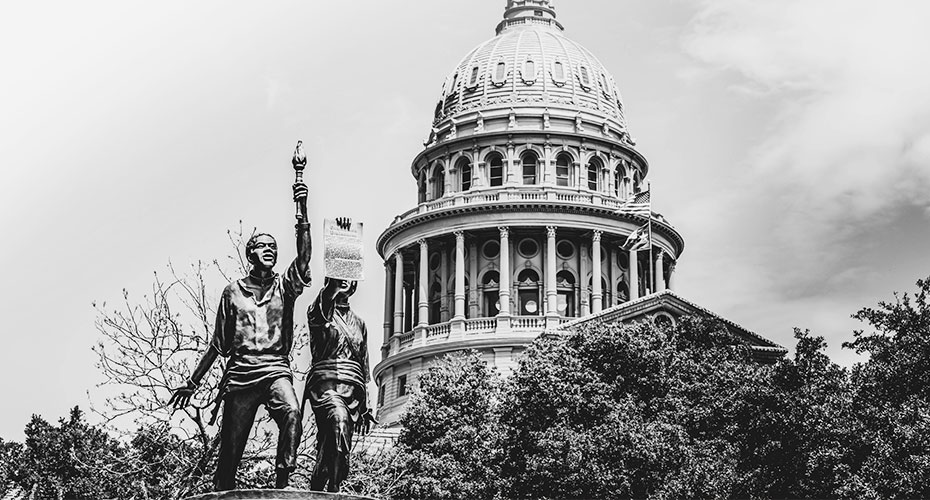Jun 14, 2022
Juneteenth’s lesson of hope
Martin Luther King once said,
“The arc of the moral universe is long, but it bends toward justice.”
The arc, in this case, is long indeed. Last year, Congress finally declared Juneteenth – long known as the Black Independence Day – a federal holiday, more than 150 years after it was first commemorated.
On June 19, 1865, two and a half years after President Lincoln signed the Emancipation Proclamation declaring an end to slavery in the Confederate states, the Union Army finally reached Galveston Texas, the farthest outpost of the Confederacy, to enforce the Proclamation — a moment commemorated in the Texas Capitol monument in the photo above. Juneteenth, marking that 19th day of June, came to be remembered as the end of more than two centuries of enslavement of African-Americans in the United States — though it would take another six months in 1865 for the Thirteenth Amendment to add a ban on slavery to our Constitution.
Among Black Americans, Juneteenth has long been a day of joy and celebration, — yet the holiday was largely unknown outside our community. Now that has changed.
American children have begun to learn about this day in history books and classrooms. They are learning about the role of Juneteenth in our country’s history of pain, oppression, freedom, hope and renewal. Naming this day a federal holiday was a small step, but an important reminder that change can happen. The first Juneteenth marked the beginning of a journey toward equality and justice, a hard and essential journey that continues today.
Juneteenth is a day for all Americans to focus on our communities and our families, to reflect, and to look for ways to promote racial and social justice in our daily lives. We can look for ways to right the small injustices that occur around us every day. But we must also keep fighting for systemic change, an end to structural racism and inequality in our country. We must seek to create a more perfect union, a union, for example, where racial and social justice prevail in our legal and judicial systems.
The holiday comes amid a national reckoning over racial justice, during a continuing pandemic that has exposed stark health inequities for Black and Brown Americans.

Who has been hit the hardest? Our neighbors who live in crowded conditions, who had to report to work through the darkest days of the pandemic, and who even now may struggle to access vaccines due to a lack of time, transportation or information. Many are people of color.
The disparities make it imperative that we continue to scrutinize our health care system’s framework of access, equity, and social determinants of health – the economic and social conditions that affect one’s well-being.
Health equity, as defined by the physician and groundbreaking epidemiology researcher Dr. Camara P. Jones, is assurance of the conditions for optimal health for all people. Achieving health equity requires valuing all individuals and populations equally, recognizing and rectifying historical injustices, and providing resources according to need.
We can't talk about health equity without talking about the social determinants of health. Access to housing is health care. Access to healthy food is health care. Being able to afford medications is health care.
Observing Juneteenth as a federal holiday does not magically erase our country’s injustices and inequities. But it represents hope that we can change our society and our health system for the better.
Hope is the lesson of Juneteenth’s long road to federal recognition.
It's a lesson, in many ways, of never giving up. This holiday reminds us to have hope that, no matter how long it takes, we will get to that place Dr. King called the promised land.
Did you find this column informative?
All Coverage content can be reprinted for free.
Read more here.
Dr. Asante was interviewed by Lindsay Kalter for this column.
Photo of Dr. Asante by Faith Ninivaggi

